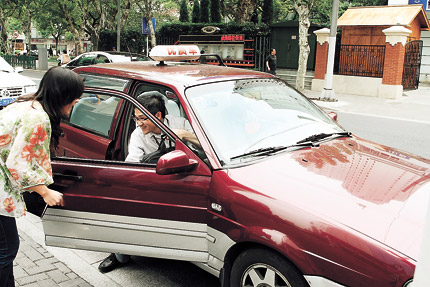Cab it? Or bag it and bike?
Sophie Chen, a freelance translator, is a frequent flier around China and takes cabs to and from the airport. She recently returned from Hong Kong and almost got into a fight with the cabbie who drove her home.
The fare from the airport to Chen's apartment is always between 180 yuan (US$26) to 190 yuan, depending on traffic, but this time it was over 200 yuan. Exhausted from work and the flight, Chen was quite upset by the unexpected price hike. She was set to argue when she noticed the blue fare label on the car window, indicating higher fares.
|
|
|
A woman rushes to a taxi, waiting for a passenger, during the morning rush hours. People often complain being unable to find a cab during rush hours. [Shanghai Daily] |
Taxi fares in Shanghai increased on October 11, and most taxis have already replaced red labels with blue ones. By the end of the month, all the 47,000 cabs are expected to raise prices.
For the first three kilometers, the price increases from 11 yuan to 12. For the next seven kilometers, it's 0.3 yuan more expensive for each kilometer.
On average, it's a 10-percent increase and reaches about 12 percent when the total distance is over 10 kilometers.
The longer the trip, the more the fare increases, compared with the previous fare.
Many Netizens are analyzing the prices and have found a strategy to save money - it's about 1.5 yuan difference between taking a 20-kilometer trip in one cab and dividing the distance with a second one.
The difference increases with longer trips and savvy people suggest changing cabs or asking a driver to reset the meter every 10 kilometers for longer trips.
"Now I understand why we are required to learn mathematics for more than 10 years in school," jokes one Netizen on a BBS.
The increase is a response to a new regulation that prohibits cabs from using cheaper, polluted 90-octane gasoline.
This means they pay more for gas and the costs are passed on to the passenger.
"The price increase makes sense, and it should have happened sooner," says driver Zhao Gang, in his 40s. "Our costs, especially gas, have been increasing, but the fare hasn't been adjusted for a long time."
The last fare increase was in 2006.
He doesn't think it will affect passengers too much. "Those who are used to cabbing it will still cab it. During rush hours people always complain about not having enough cabs."
Still, some white collars who are used to cabbing it are trying to figure out how to avoid additional costs. Even small changes in price mean a change in daily life. 'I'm seriously considering buying a car' Thirty-year-old account manager Max Zhang has hesitated for almost two years about buying a car. Like most men, he loves cars and has saved enough money to purchase a mid-range passenger car. But there's more to consider.
Owning a car can be expensive in Shanghai. There's the car plate, plus the maintenance, insurance and parking fees - not cheap. And parking places can be hard to find.
Zhang gets exhausted just thinking about driving on crowded roads after a long and tiring day.
"I would probably have to spend at least 1,500 yuan a month to keep a car. That's quite enough to cover cab fare and not having to worry about all these problems," says Zhang.
But sometimes, when all his friends are driving home after dinner and ask him whether he needs a ride, Zhang still wants to buy a car. The hike in cab fare is the last straw.
"Now I can justify spending a few hundred yuan more on cab fare, so I'm also justified in buying a car," he says.
'Guess I'll have to take the Metro once in a while' Twenty-eight-year-old Felix Wang commutes to and from work by taxi every day. Living in Xuhui District and working in Jing'an District, he spends about 80 yuan on taxi fares daily.
The other choice is the Metro. He only needs to walk for five minutes to take Metro Line 1, change to Line 2 and then walk 15 minutes to his office.
Wang is better off than many people who have to take public buses or walk half an hour to the Metro, and he knows it. "But I'm already so used to taking cabs, especially when I usually work over 12 hours."
Since the fare hike, Wang finds his daily costs have increased by about 10 yuan - that's significant since his wife only gives him 120 yuan every day to cover transport, meals and cigarettes.
She won't consider adding another 10 yuan to his daily allowance. "She says we need to save for our future and she thinks I'm already spending a lot," says Wang, sighing.
"I guess I'll have to do the subway once or twice a week. I am too dependent on cabs and we're not that rich," he concludes.
'A bike is best for people like me' Pan Qi, an administration worker at a joint venture company, jokes about biking to work after hearing about fare hikes. Her apartment is right between two Metro stations and it takes 15 minutes to walk to either one. Her office is only two Metro stops away.
"It's too much trouble to walk for so long and take only two stops," she says.
Pan often cabs it, since it's only eight yuan more expensive than "walking and getting sweaty and crushed in the jammed subway trains."
She's also fed up with traffic in Shanghai.
"The buses are too slow and crowded. The Metro is incredibly full. Cabs are more expensive. Does this mean I have to buy a car?" she asks herself.
But she can't afford a car and all that goes with it.
"I guess a bicycle is the only vehicle left for people like me," she says.
 0
0 








Comments